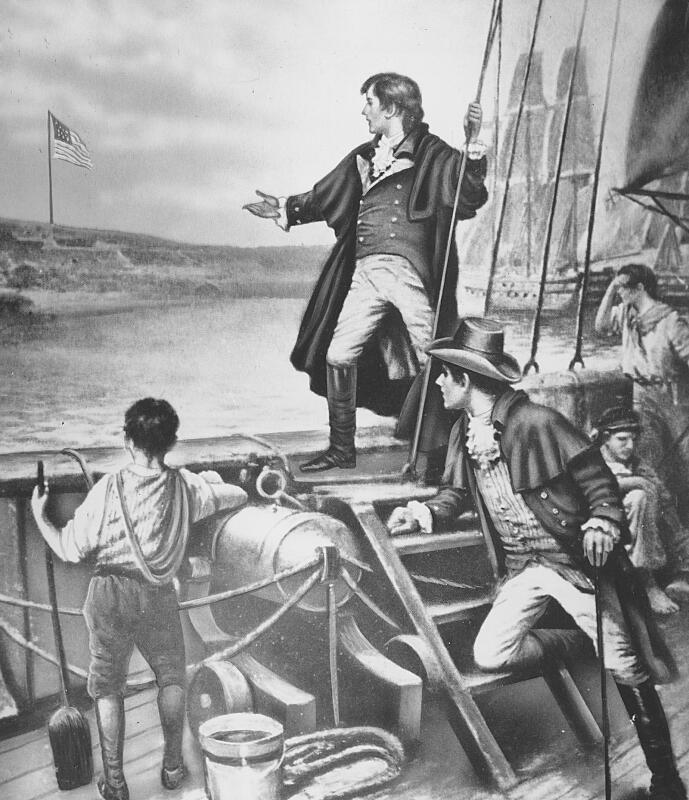Iowa House Republicans are considering a bill that would require public school students to sing the national anthem every day. It was enough to make Rep. Sue Cahill, a Democrat from Marshalltown, break into song.
Cahill asked lawmakers and onlookers to rise and sing the anthem at a subcommittee meeting on House Study Bill 587. What Cahill lacked in vocal skills was made up for with her zeal. Lawmakers sang. Lobbyists sang. Reporters, looking both amused and befuddled, recorded the whole thing.
Just when you think you’ve seen everything under the Golden Dome of Wisdom, you’re proven wrong.
Cahill was making a point. She argued that although the Statehouse is the perfect place to express patriotic fervor through song, forcing kids to sing it in school is different. For one thing, the bill requires that all students stand at attention, even if they don’t sing.
Cahill said that raises serious First Amendment issues. She voted against the bill. Her two Republican colleagues voted yes to keep the discussion going, they said.
“The school classroom is not the place for mandating the singing of the national anthem, thus mandating patriotism for students,” Cahill said. “I think that’s something students choose, and it’s something that they learn.”
You’ve got to love compelled patriotism. Just look at how happy all those North Koreans are, with frightened smiles pasted on their faces. But, boy, they sure love Kim Jong Un. Yep.
Iowa’s bill is sponsored by Rep. Skyler Wheeler, R-Orange City and one of the Legislature’s most active compellers. He led the charge last year to remove books from school libraries and erase all references to LGBTQ people from elementary school curriculum. In the past he did battle with Critical Race Theory and sought to ban the teaching of the 1619 Project. He also favors scrapping tenure at universities.
Specifically, his bill requires all teachers and students to sing at least one verse of the anthem daily. It’s probably the one that ends with “Play ball!” All teachers and students who are physically able to stand must do so and remove any “headdress” not worn for religious purposes. Students don’t have to sing the anthem, but they are required to stand “to show the full respect.”

Sign up for Pints & Politics

On some, special occasions, students will sign all four versus of the anthem. All four!
The bill would also amend social studies curriculum to include instruction on the words and meaning of the anthem, “the object and principles of the government of the United States, the sacrifices made by the founders of the United States, the important contributions made by all who have served in the armed forces of the United States … and how to love, honor and respect the national anthem.”
The bill would not apply to private schools.
A lot of this is already being taught. No one’s against learning about the government, the founders, the military, etc.
But this bill is really designed to send a message. Regurgitate the standard, rosy and conventional history of our country or there may be trouble. Nothing that makes anyone uncomfortable. And don’t even think of kneeling in protest, buster.
I have no problem with kids learning about the anthem, so long as kids learn about the most interesting aspect of the song’s story. And that’s the contradictory life of its author, Francis Scott Key.
Most of us know the basic facts. Key was on a British warship negotiating for a prisoner release during the War of 1812 on Sept. 13, 1814. He was still on the ship when the British began their bombardment of Fort McHenry, which protected Baltimore’s harbor. The Brits wouldn’t let him leave the ship.
At daybreak, Key saw the American flag was still flying over McHenry. He wrote a poem about what he had witnessed, which became our national anthem in 1931.
But you probably know less about the man than his poem. In a 2022 essay in the Baltimore Banner, University of Maryland professor Rona Kobell fills in some blanks.
Key’s family owned slaves. He married Mary Tayloe Lloyd, whose family also owned slaves, including Frederick Douglass. Key was an attorney and his law partner and friend was Roger Taney, who as a Supreme Court chief justice, handed down the infamous Dred Scott decision in 1857, declaring that all Blacks, slave and free, could never be U.S. citizens.
And yet, Key represented several Black families seeking freedom in court. Score one for Team FSK.
But Key also was a proponent of the colonization movement, which advocated sending slaves back to Africa. In a letter to Rev. Benjamin Tappan in 1838, Key wrote that Black Americans are “a distinct and inferior race of people, which all experience proves to be the greatest evil that afflicts the community.”
As a district attorney in Washington, D.C., Key prosecuted abolitionists, believing the property rights of slave owners outweighed the free speech of slavery’s opponents. One prosecution of a Black man wrongly charged with attempted murder sparked a riot.
The incongruity of his work and his poem was noted at the time by abolitionists who mocked Key’s version of America as the “Land of the Free and Home of the Oppressed.”
“He is a very representational figure in his racism and in the politics of slavery,” author Jefferson Morley told Kobell. His book “Snowstorm in August: Washington City, Francis Scott Key, and the Forgotten Race Riot of 1835″ digs into Key’s role in the riot.
So, teaching about Key is teaching what America was like before the Civil War, and the contradictions of men such as Key and Thomas Jefferson, who wrote “all men are created equal,” while owning slaves. The full details are far more compelling than the redacted version. That’s the beauty of studying history. Sift through a few layers and and you’ll learn the rest of the story.
But I doubt any of this will come up in Iowa schools. And that’s unfortunate. It simply doesn’t fit with our sunny historical mythology. Leave those layers alone. Just sing the song, kids, and then recite the Pledge of Allegiance, which has been required in Iowa schools since 2021.
What will happen to this bill? Who knows. It is the silly subcommittee season, when the Capitol’s rarefied air is filed with trial balloons. Many will pop.
But it does remind us that great nations don’t compel patriotism, fear protests or hide their history. Someone should write a song about that.
(319) 398-8262; todd.dorman@thegazette.com

 www.thegazette.com
www.thegazette.com
Cahill asked lawmakers and onlookers to rise and sing the anthem at a subcommittee meeting on House Study Bill 587. What Cahill lacked in vocal skills was made up for with her zeal. Lawmakers sang. Lobbyists sang. Reporters, looking both amused and befuddled, recorded the whole thing.
Just when you think you’ve seen everything under the Golden Dome of Wisdom, you’re proven wrong.
Cahill was making a point. She argued that although the Statehouse is the perfect place to express patriotic fervor through song, forcing kids to sing it in school is different. For one thing, the bill requires that all students stand at attention, even if they don’t sing.
Cahill said that raises serious First Amendment issues. She voted against the bill. Her two Republican colleagues voted yes to keep the discussion going, they said.
“The school classroom is not the place for mandating the singing of the national anthem, thus mandating patriotism for students,” Cahill said. “I think that’s something students choose, and it’s something that they learn.”
You’ve got to love compelled patriotism. Just look at how happy all those North Koreans are, with frightened smiles pasted on their faces. But, boy, they sure love Kim Jong Un. Yep.
Iowa’s bill is sponsored by Rep. Skyler Wheeler, R-Orange City and one of the Legislature’s most active compellers. He led the charge last year to remove books from school libraries and erase all references to LGBTQ people from elementary school curriculum. In the past he did battle with Critical Race Theory and sought to ban the teaching of the 1619 Project. He also favors scrapping tenure at universities.
Specifically, his bill requires all teachers and students to sing at least one verse of the anthem daily. It’s probably the one that ends with “Play ball!” All teachers and students who are physically able to stand must do so and remove any “headdress” not worn for religious purposes. Students don’t have to sing the anthem, but they are required to stand “to show the full respect.”

Sign up for Pints & Politics
Sign up for a periodic, lighthearted look at Iowa political news from The Gazette's opinion desk.
On some, special occasions, students will sign all four versus of the anthem. All four!
The bill would also amend social studies curriculum to include instruction on the words and meaning of the anthem, “the object and principles of the government of the United States, the sacrifices made by the founders of the United States, the important contributions made by all who have served in the armed forces of the United States … and how to love, honor and respect the national anthem.”
The bill would not apply to private schools.
A lot of this is already being taught. No one’s against learning about the government, the founders, the military, etc.
But this bill is really designed to send a message. Regurgitate the standard, rosy and conventional history of our country or there may be trouble. Nothing that makes anyone uncomfortable. And don’t even think of kneeling in protest, buster.
I have no problem with kids learning about the anthem, so long as kids learn about the most interesting aspect of the song’s story. And that’s the contradictory life of its author, Francis Scott Key.
Most of us know the basic facts. Key was on a British warship negotiating for a prisoner release during the War of 1812 on Sept. 13, 1814. He was still on the ship when the British began their bombardment of Fort McHenry, which protected Baltimore’s harbor. The Brits wouldn’t let him leave the ship.
At daybreak, Key saw the American flag was still flying over McHenry. He wrote a poem about what he had witnessed, which became our national anthem in 1931.
But you probably know less about the man than his poem. In a 2022 essay in the Baltimore Banner, University of Maryland professor Rona Kobell fills in some blanks.
Key’s family owned slaves. He married Mary Tayloe Lloyd, whose family also owned slaves, including Frederick Douglass. Key was an attorney and his law partner and friend was Roger Taney, who as a Supreme Court chief justice, handed down the infamous Dred Scott decision in 1857, declaring that all Blacks, slave and free, could never be U.S. citizens.
And yet, Key represented several Black families seeking freedom in court. Score one for Team FSK.
But Key also was a proponent of the colonization movement, which advocated sending slaves back to Africa. In a letter to Rev. Benjamin Tappan in 1838, Key wrote that Black Americans are “a distinct and inferior race of people, which all experience proves to be the greatest evil that afflicts the community.”
As a district attorney in Washington, D.C., Key prosecuted abolitionists, believing the property rights of slave owners outweighed the free speech of slavery’s opponents. One prosecution of a Black man wrongly charged with attempted murder sparked a riot.
The incongruity of his work and his poem was noted at the time by abolitionists who mocked Key’s version of America as the “Land of the Free and Home of the Oppressed.”
“He is a very representational figure in his racism and in the politics of slavery,” author Jefferson Morley told Kobell. His book “Snowstorm in August: Washington City, Francis Scott Key, and the Forgotten Race Riot of 1835″ digs into Key’s role in the riot.
So, teaching about Key is teaching what America was like before the Civil War, and the contradictions of men such as Key and Thomas Jefferson, who wrote “all men are created equal,” while owning slaves. The full details are far more compelling than the redacted version. That’s the beauty of studying history. Sift through a few layers and and you’ll learn the rest of the story.
But I doubt any of this will come up in Iowa schools. And that’s unfortunate. It simply doesn’t fit with our sunny historical mythology. Leave those layers alone. Just sing the song, kids, and then recite the Pledge of Allegiance, which has been required in Iowa schools since 2021.
What will happen to this bill? Who knows. It is the silly subcommittee season, when the Capitol’s rarefied air is filed with trial balloons. Many will pop.
But it does remind us that great nations don’t compel patriotism, fear protests or hide their history. Someone should write a song about that.
(319) 398-8262; todd.dorman@thegazette.com
Opinion: Compelled patriotism teaches Iowa students the wrong lesson
Republican Iowa House bill would require public school students to sing the national anthem each day.



